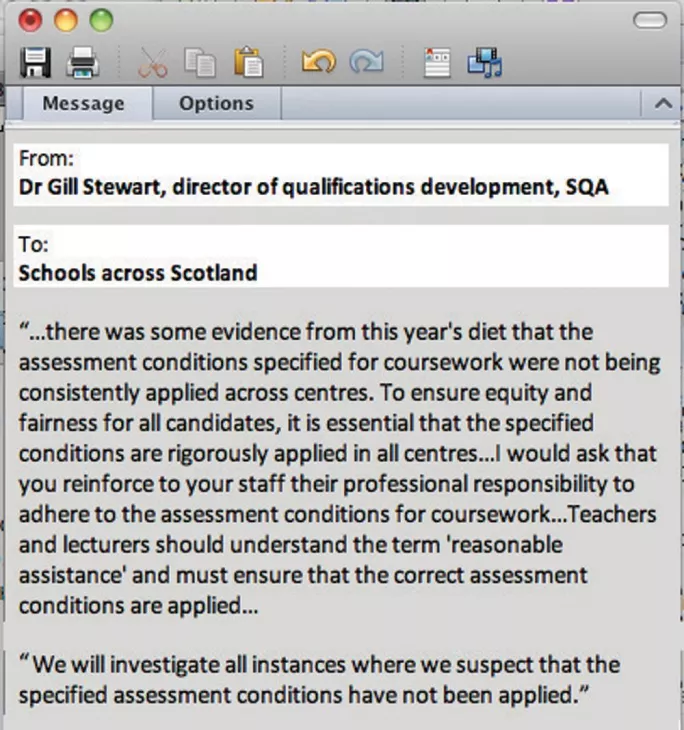Teachers feel ‘branded as cheats’ by SQA over coursework

Scotland’s exam body has become embroiled in a fresh battle with teachers over suggestions that schools are “cheating the system” when it comes to pupils’ coursework, TESS can reveal.
The latest spat between teachers and the Scottish Qualifications Authority (SQA) - which many secondary school staff blame for their workload woes - comes just days after the SQA was forced to scrap controversial assessments associated with the new national qualifications.
Now teachers are accusing the body of branding them “cheats” after its director of qualifications development, Gill Stewart, sent an email to schools questioning whether teachers were following rules around the help they can give pupils with coursework.
Most of the new national qualifications have a coursework element that counts towards candidates’ final mark; pupils sitting Higher English, for example, have to complete a writing folio that counts for 30 per cent of their grade.
In her email, Dr Stewart asked schools to remind staff of “their professional responsibility to adhere to the assessment conditions for coursework” and said that all teachers and lecturers should understand the term “reasonable assistance” after “some evidence” of inconsistency last year.
‘This approach, whereby every school stands accused, seems ill-judged’
Markers would be asked to highlight “any instances where they suspect the assessment conditions have not been applied” and statistical checks would be carried out on a subject-by-subject basis, the email warned.
“We will investigate all instances where we suspect that the specified assessment conditions have not been applied,” Dr Stewart’s message concluded.
The email was branded “grossly insulting” by Larry Flanagan, general secretary of the EIS teaching union, who said that it essentially accused teachers of “cheating the system”.
“They are either suggesting teachers are helping pupils too much or there is too much leeway in terms of redrafts,” he said.
Some teachers believed the SQA was being “mean-spirited” after its hand had been forced by the government, leading to the axing of unit assessments, Mr Flanagan added.
The mandatory assessments, which teachers argue have made their workload unmanageable and pile pressure on pupils, are set to be scrapped for National 5 in 2017-18 and Higher in 2018-19 (see box, “Assessments axed after workload complaints”, below).
Mr Flanagan added: “While we think that the SQA guidelines around coursework should be adhered to, if the SQA has evidence of some instances where that is not the case it should deal with them.
“This kind of general approach, whereby every school in the country stands accused, seems ill-judged and ill-tempered.”
‘System pressures’
However, Mark Priestley, an expert in curriculum theory at Stirling University, told TESS that in some schools it was likely there was pressure to inflate coursework grades. That was not because teachers were cheating but because of “system pressures”, he said.
Meanwhile, in the TES online forums, while some teachers responded angrily to the SQA email, others conceded that Dr Stewart was “probably right”.
One said: “The temptation to help [students] a little bit too much will be too great for a lot of teachers.” Another commented: “We’re not cheating gits, but when you’ve worked really hard to try and create a silk purse from a sow’s ear, it’s much more difficult to give the right mark.”

Professor Priestley said: “We have got a system that places high emphasis on accountability to the extent that assessment is not only high-stakes for kids, but for teachers as well. That is a problem. High-stakes assessment leads to the development of cultures of performativity in schools, where the main emphasis can be on raising grades, rather than on education in its broader sense.
“High-stakes accountability is the culprit here because of the pressure it places on schools and teachers.”
A spokesperson for the SQA told TESS that the body’s priority was to ensure equity and fairness for all candidates while, at the same time, ensuring that the standard and credibility of qualifications was maintained.
The issue around coursework had already been highlighted in the chief examiner’s report published on results day, he said, adding: “This communication about coursework was a follow-up sent to heads of centre as part of that ongoing process.”
You need a Tes subscription to read this article
Subscribe now to read this article and get other subscriber-only content:
- Unlimited access to all Tes magazine content
- Exclusive subscriber-only stories
- Award-winning email newsletters
Already a subscriber? Log in
You need a subscription to read this article
Subscribe now to read this article and get other subscriber-only content, including:
- Unlimited access to all Tes magazine content
- Exclusive subscriber-only stories
- Award-winning email newsletters